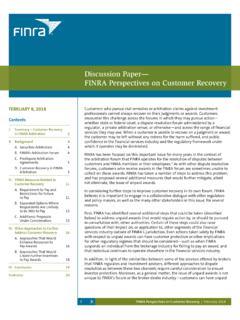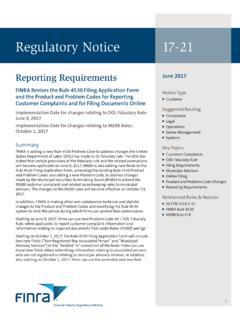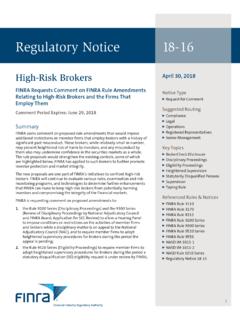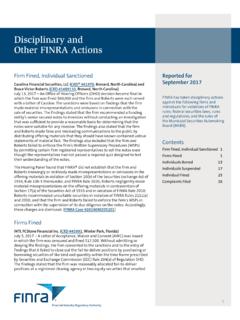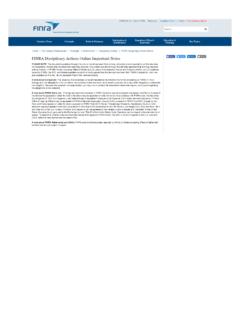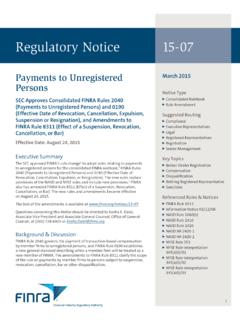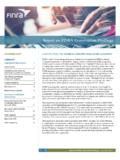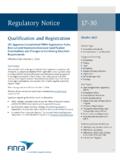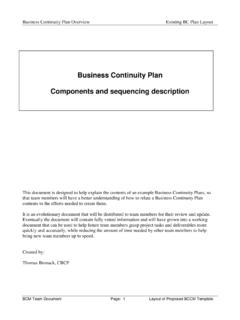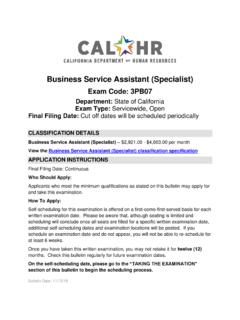Transcription of DISCOVERY GUIDE (2013) - finra.org
1 DISCOVERY GUIDE This DISCOVERY GUIDE and Document Production lists supplement the DISCOVERY rules contained in the finra Code of Arbitration Procedure for Customer Disputes ( Customer Code ) (See Rules 12505-12511). No requirement under the DISCOVERY GUIDE supersedes any record retention requirement of any federal or state law or regulation or any rule of a self-regulatory organization. Flexibility in DISCOVERY The DISCOVERY GUIDE , including the Document Production lists ( lists ), serves as a GUIDE for the parties and the arbitrators. While the parties and arbitrators should consider the documents described in the lists presumptively discoverable, the parties and arbitrators retain their flexibility in the DISCOVERY process.
2 Arbitrators can: order the production of documents not provided for by the lists ; order that parties do not have to produce certain documents on the lists in a particular case; and alter the production schedule described in the 12500 series of rules. Cost or Burden of Production A party may object to producing a document on a List because of the cost or burden of production. If the party demonstrates that the cost or burden is disproportionate to the need for the document, the arbitrators should determine if the document is relevant or likely to lead to relevant evidence.
3 If the arbitrators determine that the document is relevant or likely to lead to relevant evidence, they should consider whether there are alternatives that can lessen the impact, such as narrowing the time frame or scope of an item on the lists , determining whether another document can provide the same information, or ordering a different form of production. 1 Requests for Additional Documents Where additional documents may be relevant in a particular case, parties can seek them in accordance with the time frames provided in the 12500 series of rules.
4 Arbitrators must use their judgment in considering requests for additional documents and may not deny document requests solely on the ground that the documents are not expressly listed in the DISCOVERY GUIDE . Nothing in the DISCOVERY GUIDE precludes the parties from voluntarily agreeing to an exchange of documents in a manner different from that set forth in the DISCOVERY GUIDE . finra encourages the parties to agree to the voluntary exchange of documents and to stipulate to various matters. The fact that an item appears on the lists does not shift the burden of establishing or defending any aspect of a claim.
5 Only named parties must produce documents pursuant to the guidelines set forth herein. However, non-parties may be required to produce documents pursuant to a subpoena or an arbitration panel order to direct the production of documents (see Rule 12513). In addition, the arbitrators may use the lists as guidance for DISCOVERY issues involving non-parties. Parties and arbitrators should recognize that not all firms have the same business operations model and certain items on the lists may not apply to a particular case when the firm s business model ( full service firm, discount broker, clearing firm, or online broker) is taken into consideration.
6 In addition, certain items on the Customer List may not apply to a particular case depending on the claims asserted. Absent a written objection or party agreement, the parties shall exchange documents on the lists within the time frames set forth in the Customer Code. Parties should raise any objections to the production of documents, based on an established privilege, in accordance with the time frames for objections set forth in the Customer Code. 2 Form of Production The parties are encouraged to discuss the form(s) in which they intend to produce documents (hard copy production or electronic production in its original format or some other format) and, whenever possible, agree to the form(s) of production.
7 Both hard copy documents and electronic files are documents within the meaning of the DISCOVERY GUIDE . Parties must produce electronic files in a reasonably usable format. The term reasonably usable format refers, generally, to the format in which a party ordinarily maintains a document, or to a converted format that does not make it more difficult or burdensome for the requesting party to use in connection with the arbitration. The arbitrators shall decide any dispute that arises concerning the form in which a document will be produced. When resolving contested motions relating to the form of production, arbitrators should consider the totality of the circumstances including, among other matters, the following in determining whether the electronic files are in a reasonably usable format: 1.
8 For documents in a party s possession or custody, whether the chosen form of production is different from the form in which a document is ordinarily maintained; 2. For documents that must be obtained from a third party (because they are not in a party s possession or custody), whether the chosen form of production is different from the form in which the third party provided it; and 3. For documents converted from their original format, a party s reason(s) for choosing a particular form of production; how the documents may be affected by the conversion to a new format; and whether the requesting party s ability to use the documents is diminished by a change in the documents appearance, searchability, metadata, or maneuverability.
9 3 Confidentiality If a party objects to document production on grounds of privacy or confidentiality, the arbitrators or one of the parties may suggest a stipulation between the parties that the documents in question will not be disclosed or used in any manner outside of the arbitration of the particular case, or the arbitrators may issue a confidentiality order. When deciding contested requests for confidentiality orders, arbitrators should consider the competing interests of the parties. The party asserting confidentiality has the burden of establishing that the documents in question require confidential treatment.
10 In deciding questions about confidentiality, arbitrators should, taking into account the facts of a particular case, consider factors such as the following: 1. Whether the disclosure would constitute an unwarranted invasion of personal privacy ( , an individual's Social Security number, or medical information). 2. Whether there is a threat of harm attendant to disclosure of the information. 3. Whether the information contains proprietary confidential business plans and procedures or trade secrets. 4. Whether the information has previously been published or produced without confidentiality or is already in the public domain.
